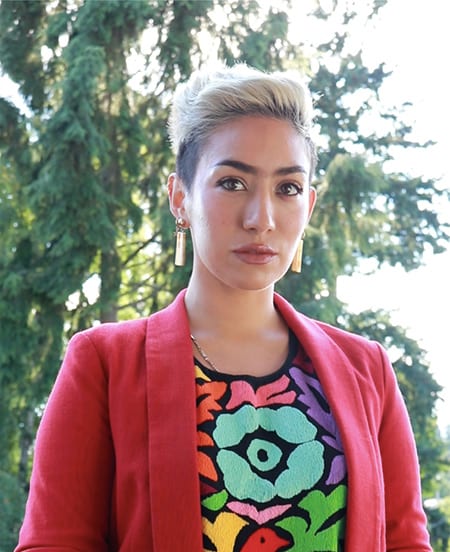From large firms to nonprofits and government agencies to startups, Berkeley Law students are currently immersed in a dizzying array of enriching jobs. Throughout the summer, we will present first-person accounts from students who are doing compelling work.
Ximena Velázquez-Arenas ’23 is an incoming co-president of the Student Association at Berkeley Law, for which she was a 1L representative last year. Active in four student journals, she also worked as a student advocate for the Digital Rights Project and the Prisoner Advocacy Network Clinic. President of the University of Southern California’s College Democrats and Oxfam America chapters as an undergraduate, Velázquez-Arenas worked before law school as a policy analyst for Washington State’s House of Representatives and Office of the Attorney General. Before that, she was a political organizer for a union that represented 45,000 long-term care workers in Washington State and Montana.
Below, Velázquez-Arenas describes her summer work experience at the Washington State Supreme Court:

Like so many others, COVID-19 altered my plans. In August 2020, I abruptly packed up all my belongings and left Washington State to live with my family in Mexico, indefinitely.
I started online law school and spent many months mourning various losses — of community, work, and the pervasive fear behind each news update. Fueled by the isolation of virtual education, I became hyper-involved in student activities, including Student-Initiated Legal Services Projects, journals, and student government.
Across the organizations, students shared disillusionment with the lack of Critical Race Theory in doctrinal immersion studies. It seemed everywhere else in our lives, CRT was playing a major role from how our communities were being impacted by the pandemic, state violence, or climate change, to whether our homes had stable internet connection for class.
The debate over CRT on campus reminded me of fights back in Washington, where the state had attempted (and failed) numerous efforts to weave CRT across public schools. Yet one unlikely victory stood out, beaming like a lighthouse for unmoored law students: Washington had just elected the most diverse state supreme court in U.S. history. I had to apply for an externship.
Now back in Washington for the summer, I’ve returned “home” as a judicial extern in the chambers of Chief Justice Steven González ’91 (while in law school, Justice González was an active member of the Berkeley La Raza Law Journal). The court has been a nourishing environment. It has affirmed many changes I experienced behind a computer screen and challenged me as a legal thinker and writer. After a year battling for CRT reform on campus, it has also been striking to witness the court’s dedication to tackle systemic racism and other oppressive dynamics in the administration of justice.
The values the court is working towards are not limited to abstract desires but are applied in the daily interactions among staff and communications with the public. I work with a diverse team, including one of the longest-serving clerks (she just made history as the court’s first senior law clerk) and other amazing externs. One is even a rising senior in college!
Each week, our small team (a mighty eight) gathers to discuss petitions for review. The court receives thousands of these each year and can only take about a hundred, so externs have a steep and fast learning curve to draft recommendations for how the court should respond. Before our recommendations are memorialized in writing, the team meets to discuss the docket.
The conversations are deep dives into the applicable legal and procedural standards, but they also explore the larger context. This is often where bias and systemic racism hide in plain sight. Sometimes there is no simple answer, which is another theme I’ve learned this summer: acknowledging the doubt or challenge of a particular legal question is an important exercise in intellectual humility.
The Washington State Supreme Court doesn’t just decide cases; it also writes the court rules and the rules of practice, and it oversees the administration of justice. I’ve had the opportunity to do real work in this arena too, on everything from COVID-related emergency rules to the rules of professional conduct. For example, I researched and wrote proposals to help the court become more inclusive of transgender and gender-diverse people.
Working for the Washington State Supreme Court during my first summer as a law student has been an awesome privilege. The experience has left me with a fuller appreciation for the relationships among law, community and culture, as well as a clearer vision for who I hope to be in that story.